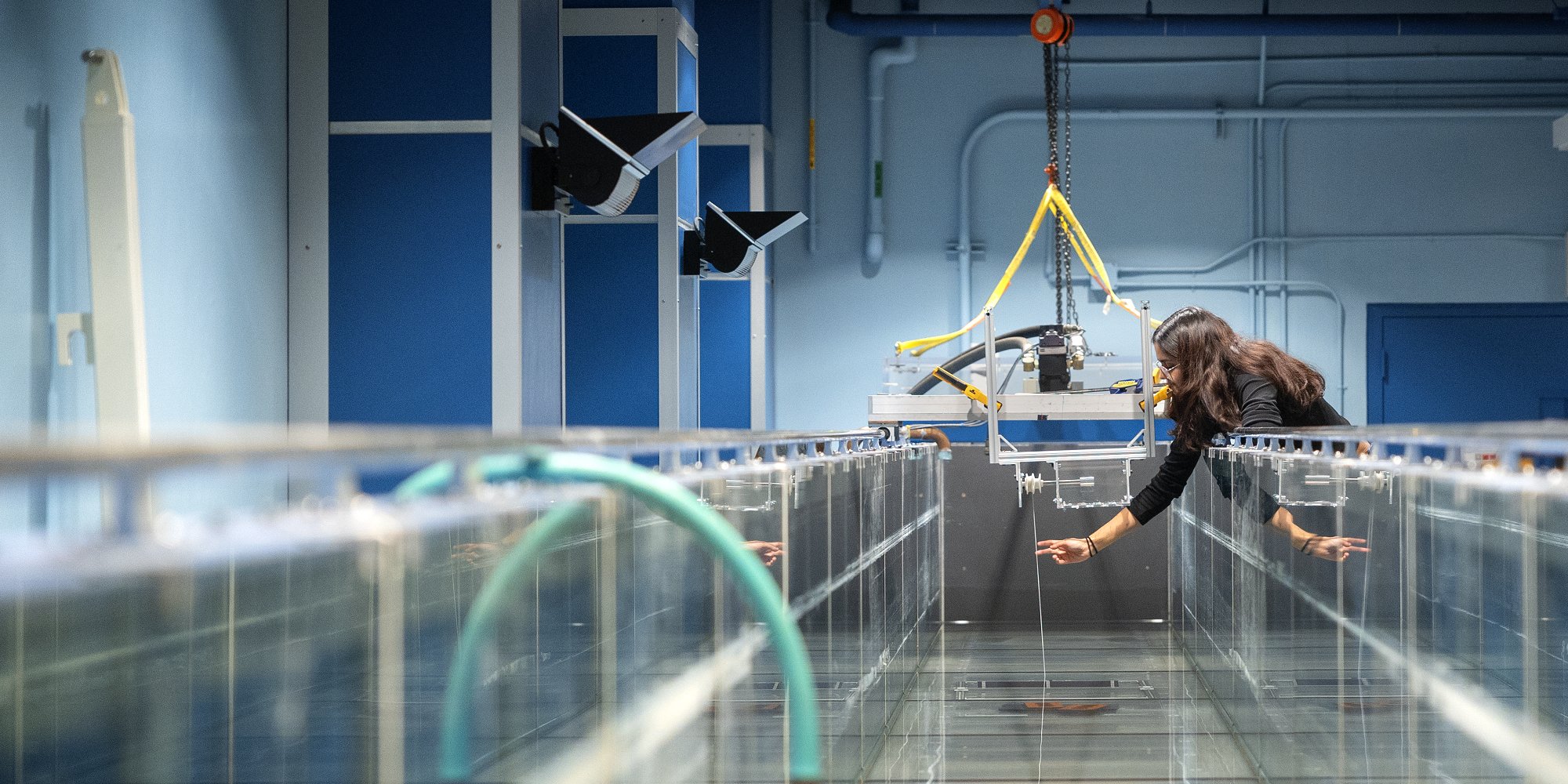Funding to Support Faculty- and Graduate Student-mentored Undergraduate Research Teams
Cornell Atkinson Center for Sustainability is supporting faculty-led summer opportunities for undergraduates conducting sustainability research, structured as a pair of undergraduate researchers mentored by a graduate student and faculty principal investigator. By offering this tiered mentorship structure, proposed projects are intended to prepare undergraduates to conduct independent research in a collaborative environment.
How to Apply
Eligibility:
- Professorial faculty and non-visiting faculty with a primary appointment at Cornell University, in any college, may apply. See Cornell PI eligibility guidelines.
The 2026 Cycle Is Closed:
- Previous Request for Proposals
Awards
Supporting Kanaka ‘Ōiwi (Native Hawaiian) Food Security through Water Quality Monitoring and Storytelling

Food security is one of the most pressing climate risks for the Pacific Islands. Food economies have become highly dependent on imports, while access to traditional food systems has been greatly diminished due to colonialism. Set in Hawai‘i, where 90% of food is imported, this project supports community monitoring of terrestrial and marine water bodies foundational to restoring traditional food systems. In conjunction with water quality monitoring, student researchers will engage in kanaka ‘ōiwi methodologies of mo‘olelo (storytelling) with community members to contextualize past, present, and future human-environment connections, and integrate traditional knowledge into adaptation strategies.
Faculty Lead: Steven Mana‘oakamai Johnson, Natural Resources and the Environment, Cornell CALS
Graduate Student Mentor: Aspen Russell, Ph.D. Student, Information Science
Influence of Long-Term Trends in Tropical Pacific Sea Surface Temperatures on Atmospheric Rivers and their Impacts in Western North America

Atmospheric rivers are important drivers of regional hydroclimate variability in Western North America, providing moisture for municipal water use, irrigation, and hydropower – but they also pose a flood and landslide risk due to their excessive precipitation. Better understanding the response of atmospheric rivers to climate change would enable us to better characterize and ultimately constrain the future risk of floods and droughts in Western North America. In this project, student researchers will use a new set of climate model simulations designed to more comprehensively sample atmospheric variability associated with different sea surface temperature trend patterns. The research will deliver a more robust description of the influence of climate change on atmospheric rivers, providing new insights into regional flood and drought risk that can inform adaptation planning.
Faculty Lead: Flavio Lehner, Earth and Atmospheric Sciences, Cornell CALS
Graduate Student Mentor: Yan-Ning Kuo, Ph.D. Student, Earth and Atmospheric Sciences
Rapid Small-Scale Manure Tests (RSSMT) to Screen Manure Additives to Steer the Development of Larger Mesocosm Projects
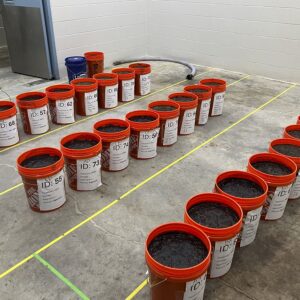
Slurry manure storages used widely by dairy farms to protect water quality are an unintended yet substantial source of methane, ammonia, and other emissions that impact climate, air quality, and human health. While available technologies can reduce these emissions, they are expensive, complex, and not suitable for most dairy farms. This project investigates direct dairy manure storage additives as a more affordable, lower-tech, and scalable treatment for these emissions through two experimental systems: rapid small-scale manure tests (RSSMT) and manure mesocosms. Students will expand upon the RSSMT work through the vetting of different classes of manure additive for their greenhouse gas emission reductions, one focused on sulfur additives and the other on acid treatment.
Faculty Lead: Jason Paul Oliver, Animal Science, Cornell CALS
Graduate Student Mentor: Joel Steven Tinoco Valarezo, MS ‘26, Animal Science
Investigating Methane Management Levers in Subtropical Pasturelands
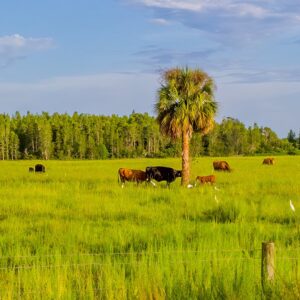
Reducing methane emissions through rangeland management practices offers potential rapid climate mitigation due to methane’s short atmospheric lifespan and high warming potential. Approximately 50% of all methane emissions come from human activities, with livestock and agricultural practices being among the largest contributors. Therefore, providing methane reduction strategies to land managers in the agricultural sector is an opportunity to ameliorate climate change. Students will contribute to ongoing research by exploring two areas: (1) how plant structures influence methane transport, and (2) how deep soil layers affect methane production, using ground-penetrating radar. In collaboration with Archbold Biological Station Buck Island Ranch, one of the largest experimental cattle ranches in the United States, this work provides hands-on experience in sustainability science and helps identify practical ways to reduce greenhouse gas emissions from agriculture.
Faculty Lead: Jed P. Sparks, Ecology and Evolutionary Biology, Cornell CALS
Graduate Student Mentor: Allasandra Valdez, Ph.D. Student, Ecology and Evolutionary Biology
Impacts of Rural Out-Migration on Traditional Livestock Herding Practices in Mongolia
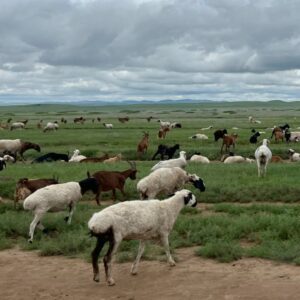
Mongolia, at the heart of Central Asia, is the home of one of the largest remaining grassland ecosystems in the world. Grassland comprises 73% of Mongolia and supports over 67.1 million head of livestock and almost 181,000 herding families. Nearly one-third of the nation’s population relies on livestock production as its primary livelihood. However, rapid social and demographic shifts in rural communities, in combination with a changing climate, are threatening sustainable management of herding and grassland resources. This project will take advantage of a recent survey of herders in Mongolia to investigate how contemporary changes in migration are impacting livestock management practices.
Faculty Lead: Ginger Allington (Natural Resources and the Environment)
Remote Sensing of Greenland’s Supraglacial Hydrology in a Changing Climate
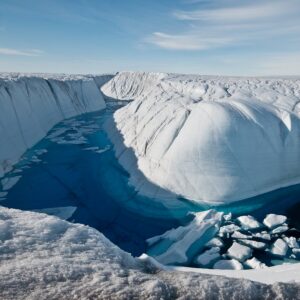
Narrowing the uncertainty in future sea level contributions from the Greenland ice sheet requires a more complete understanding of ice sheet hydrology. In particular, constraining the rate and timing of surface meltwater runoff is critical to projecting future mass loss as melting moves further inland on the ice sheet. This project will use satellite optical remote sensing and airborne ice-penetrating radar data to study how meltwater flows across the ice sheet surface and how some of that water is temporarily impounded in subsurface buried lakes. The researchers’ work will provide greater insight into how and why meltwater transport and storage pathways vary between different regions of the Greenland Ice Sheet.
Faculty Lead: Riley Culberg (Earth and Atmospheric Sciences)
Refining the Selection of Stocked Strains of ‘Wild’ Food Fishes to Enhance Productivity and Nutritional Value
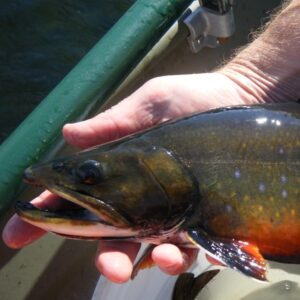
This project will introduce undergraduate researchers to the challenges of maximizing the quantity and quality of food produced under a changing climate, using hatchery-supported lake fisheries as a case study. They will compare growth rates and tissue nutrient content among the six strains of brook trout stocked by the New York State Department of Environmental Conservation to assess differences among strains from both food system and climate resilience perspectives. These projects will build upon our team’s recent finding that brook trout strains differ in temperature tolerances and that fish from different lakes have highly divergent concentrations of omega-3 fatty acids and heavy metals. Working in a collaborative environment at our Adirondacks field station, students will gain experience with fishery and climate change research methods, and their projects will clarify the potential for adjusting stocking practices to enhance the contribution of trout fisheries to food security in rural, low-income settings.
Faculty Leads: Thomas Detmer and Peter McIntyre (both Natural Resources and the Environment)
Cow-Calf Contact Effects on Cow Udder Health and Calf Pneumonia Risk
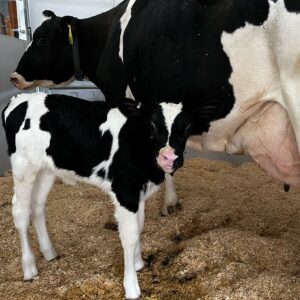
Most U.S. dairy farmers follow current management recommendations to immediately separate a cow from her calf after she gives birth. However, recent research suggests that prolonged cow-calf contact may reduce the risk for mastitis in cows and respiratory disease in calves, lessening the need for antibiotics. While addressing food insecurity is of paramount importance globally, it is critical to ensure that solutions do not come at the detriment of livestock health and welfare, that they fulfill sustainable production needs, and that they meet consumer expectations. This project will evaluate differences in health and behavior between cows and calves that have prolonged contact or are separated immediately after birth. In addition to participating in collaborative research, an undergraduate will lead an independent part of the study focusing on cow udder health and milk production, or calf lung health.
Faculty Lead: Sabine Mann (Population Medicine and Diagnostic Sciences)
Group-based Influences on Pro-environmental Beliefs, Attitudes, & Behaviors

In practice, most climate change communication efforts focus on providing the public with information, but informational approaches have been shown to have limited effect. Interpersonal communication, however, may boost effectiveness of information. Recent research shows that conversation with family & friends increases knowledge about the scientific consensus on climate change and belief in its human cause. Further, under some circumstances, group discussion can increase motivation for the adoption of mitigation policies and practices. However, the parameters of these conversations are poorly understood. Team McLeod will conduct focus group discussions with affiliates of the Cornell Lab of Ornithology and the Roman Catholic Diocese of Rochester to examine how two parameters – familiarity among interactors and rapport-building – affect: (1) changes in knowledge, beliefs and attitudes, (2) intentions to adopt carbon footprint reduction behaviors, and (3) actual adoption of these reduction behaviors. These data will help develop best practices for having constructive conversations about climate change.
Faculty Lead: Poppy McLeod, Communication
Graduate Lead: Luke Dye
Undergraduates: Beck Kerdman, Garrett Spillerman
Quantifying the Formation of Lithium Resources for the Sustainable Energy Transition
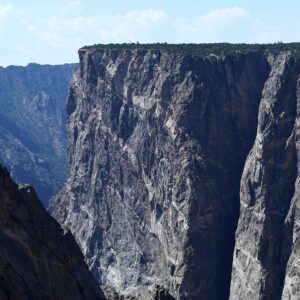
Accelerating the adoption of new forms of clean energy requires new geological resources to meet demand for the critical element lithium (Li). The World Bank estimates that by 2050, the demand for Li will quintuple 2018 production levels. The highest concentration of Li per ton of material is found in pegmatitic granite deposits, but little is known about the thermodynamic mechanisms that lead to high-grade, economically viable Li in these ore deposits. This lack of information hampers the ability to locate and identify new high-grade ore deposits. Team Holycross will conduct controlled experiments, with heat and pressure as variables, to measure these effects on the distribution of Li in granites. This information will enhance the accurate prediction of the distribution of Li resources.
Faculty Lead: Megan Holycross, Earth and Atmospheric Sciences
Graduate Lead: Odalys Callejas
Undergraduates: Alfredo Con, Gabe Larouche
Design & Testing of Wave Energy Converter Farms to Meet Grid-scale Electricity Demands
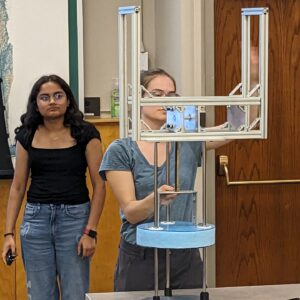
Energy derived from water waves is a potential new form of clean energy, but it requires the development of wave energy converters (WECs) in order to apply it for grid-scale energy. This project begins with building 2 WEC prototypes – (1) RM3 extracts energy from the vertical motion of waves (aka “heave”), and (2) RM5 extracts energy from the horizontal motion of waves (aka “surge”). Testing occurs in a simulated environment, the Long Stroke Wave Tank. After testing individually, the team will build a mechanism to allow testing of the 2 prototypes to be conducted simultaneously in order to study how their interactions affect overall power output. Experimental conditions will be adjusted by order, spacing, and control systems, and the data will be analyzed to understand how best to optimize overall power output.
Faculty Lead: Maha Haji, Mechanical and Aerospace Engineering
Graduate Lead: Olivia Vitale
Undergraduates: Aisha Brundan, Kavya Mittha
